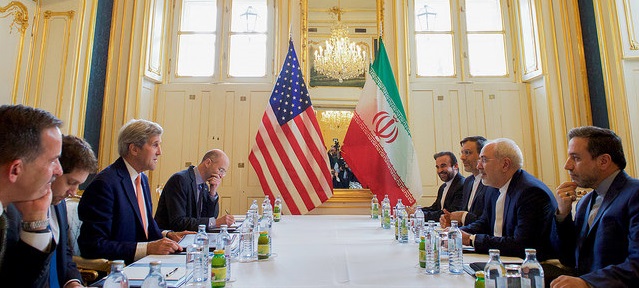On May 19, Britain, France, Germany, the European Union and the United States released a joint statement encouraging European banks and businesses to invest in Iran. “We will not stand in the way of permitted business activity with Iran,” they said. As part of the nuclear deal that was implemented in January 2016, Iran received sanctions relief in return for significantly limiting its nuclear program. But many banks and businesses still have reservations about doing business with Iran, due to the lack of clarity on sanctions and also due to Iran’s need for banking and economic reform.

Iranian officials have argued that the United States, in particular, has fallen short of its obligations under the nuclear deal. “The United States needs to do way more. They have to send a message that doing business with Iran will not cost them [European banks],” Foreign Minister Mohammad Javad Zarif told The New Yorker in April. Secretary of State John Kerry and Zarif met on May 17 in Vienna to discuss implementation issues.
In their joint statement, the United States and its European partners said they are committed to providing clarity on sanctions-related issues. They also noted, however, that ultimately “businesses will make their own decisions about commercial activity with Iran.” They encouraged Iran to follow recommendations of the Financial Action Task Force, which in February 2016 expressed “concerned about Iran’s failure to address the risk of terrorist financing and the serious threat this poses to the integrity of the international financial system.” The following is the full text of the joint European and U.S. statement.
Statement by France, Germany, United Kingdom, United States and the High Representative of the European Union for Foreign Affairs and Security Policy on Post-JCPOA Business with Iran
Under the Joint Comprehensive Plan of Action (JCPOA), the European Union and the United States have lifted economic and financial nuclear-related sanctions on Iran in exchange for Iran’s significant curtailment of its nuclear program. This commitment to lift sanctions was fulfilled on Implementation Day, January 16, 2016, and, as a result, there are now extensive economic opportunities for companies and financial institutions in Europe and around the world to do business in Iran.
The interest of European and other global firms in Iran is high, and it is in our interest and the interest of the international community to ensure that the JCPOA works for all participants, including by delivering benefit to the Iranian people. This includes the reengagement of European banks and businesses in Iran.
We will not stand in the way of permitted business activity with Iran, and we will not stand in the way of international firms or financial institutions' engaging with Iran, as long as they follow all applicable laws. In the JCPOA, all parties pledged to take steps to ensure Iran’s access in areas of trade, technology, finance and energy. In this context, the EU and its Member States are exploring possible areas of cooperation with Iran, including the use of export credits to facilitate trade, project financing, and investment in Iran. Importantly, the due diligence required for sanctions compliance is by no means unique to business opportunities in Iran.
Our governments have provided extensive guidance on the scope of sanctions lifted and those that remain in place and will continue to do so including through additional guidance. We understand that firms may continue to have specific sanctions-related questions or concerns about doing business in Iran, and we stand ready to provide expeditious clarifications. We encourage firms to approach our governments to address remaining questions, rather than forgo opportunities due to misperceptions or lack of information.
While we are committed to providing clarity on sanctions-related issues, businesses will make their own decisions about commercial activity with Iran. There are factors within Iran’s control that have influenced companies’ decision-making and hindered Iran’s economic progress. For Iran to realize the economic improvement it desires, it will also have to take steps to create an environment conducive to international investment particularly regarding the compliance with FATF recommendations. We are ready to fully support Iran's efforts in this process.
On our part, we are committed to continue actively engaging with the private sector in order to clarify all sanctions-related matters and ensure that permissible business is not prevented by the lack of information. It is in our interest and the interest of the international community to ensure that the JCPOA works for all participants.
